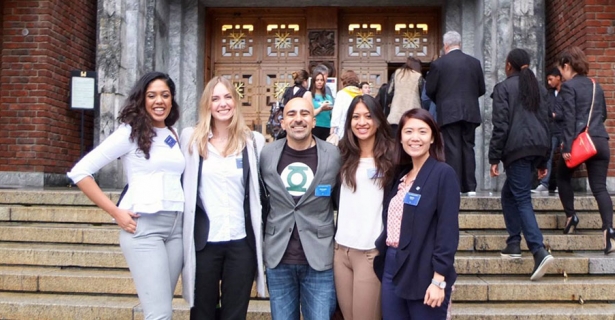Oslo Scholars from Tufts University and Mcgill University outside the City Hall with last year's OFF speaker, Suleiman Bakhit, right before entering the Monday evening reception hosted by the mayor of Oslo.
After have kept in correspondence over e-mail weeks before, I was elated to meet Suleiman Bakhit at the Oslo Freedom Forum. He wasn’t hard to spot – his charisma and laughter filled the room as he chatted heartily with another TED fellow alumnus. I went over to introduce myself as his mentee, and knew instantly that we would hit it off.
Suleiman Bakhit, known for his brilliant idea of fighting extremist ideology in the Middle East with positive heroism through localized comic books, struck to me as humble, earnest and approachable. Both Suleiman and I share a common appreciation for narratives. Over the course of the forum, he took the effort to not only get to know me in understanding how we could work together over the summer, but also as a person and understanding my background and the context in which I build my perspective of the world. He also extended the similar friendship and guidance to the other Oslo Scholars, and I will fondly remember all the great and enriching conversations.
Despite just having achieved a huge milestone in Jordan by clinching an agreement with the government to use his comic books as official teaching material in schools, Suleiman is already looking forward and thinking ahead of new opportunities and projects that he could execute with the support and help of his expansive network. He shared with me that he’s currently in the research and prototype phase of creating an Arabic female superhero. There was an instance where Benya and I teased that the character should be named “Alaa”, after Benya’s outstanding mentor: Alaa Murabit.
For the summer, Suleiman tasked me to work together with him on learning how we could use crowdfunding in actualizing a mobile app that would accompany the launch of his new comic books. We have been doing extensive market research on various platforms such as Kickstarter, Indiegogo, and GoFundMe. Looking at their various terms and conditions, trends of successes and failures, examples of their groundbreaking projects and so on has allowed us a much better understanding of how to harness the power of a global audience. We noted three important lessons on how projects should be crafted to succeed: (1) set a realistic goal, (2) only launch a crowd funding project when there is a sizable following, and (3) create tangible rewards.
In addition, we have also been comparing various online platforms and applications available on the market today that are tailored for convenient browsing of comic books. We analyzed market leaders like Comixology, and discussed how we could adapt from its model. We studied more niche options too, such as Spottoon, ComicsPlus and ComicZeal. From looking into competitors and similar products, we are hoping to brainstorm a list of features and functions that we can propose to a prospective software developer.

